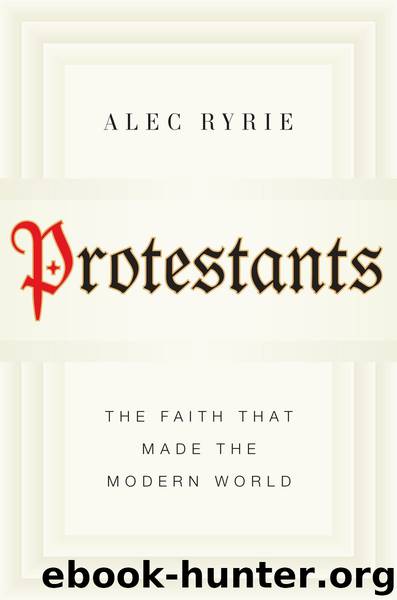Protestants by Alec Ryrie

Author:Alec Ryrie
Language: eng
Format: epub
Publisher: Penguin Publishing Group
Published: 2017-02-28T11:10:30+00:00
CHAPTER 11
Two Kingdoms in the Third Reich
And who is my neighbor?
—LUKE 10:29
Not many people saw it coming. While most Europeans and Americans were expecting the great struggles of the twentieth century to pit them against old dynastic empires, Communism’s godless legions, or the fanatical Asiatic hordes, another, more pernicious ideology was taking root. Even those who found it distasteful were slow to realize that it was worse than any other supposed threat. Nazism was eventually crushed, but the price was the bloodiest war and the most terrible genocide in human history.
This happened in the cradle of Protestantism. A handful of German Protestants stood heroically against it, but many more were its collaborators or cheerleaders. If we are to understand modern Protestantism, we need to understand why so many Protestants went along with Nazism as far as they did, and why some of them decided they could go no further.
Nazism itself was neither religious nor atheistic, in the normal senses of those words. Adolf Hitler never openly renounced the Catholicism in which he was raised, but he was vehemently anticlerical, and he came to view Christianity as “a fairy story invented by the Jews” and a Jewish-Communist conspiracy against the German people. Yet he also dismissed atheism, the Communists’ creed, as subhuman and mocked attempts by some Nazis to revive ancient Nordic paganisms. Since the Nazi Party’s first formation in 1920, it had been formally committed to “positive Christianity,” but this slippery concept was a code for opposing individualism and “the Jewish-materialistic spirit.” Nazism actively rejected Christianity’s ethic of compassion and humility, in favor of the supposedly German virtues of heroism, strength, and patriotic pride. Although Hitler thought Nazism should foster some “notion of divinity,” it found its spiritual meaning not in any god but in the purity of the Aryan race, a purity whose highest expression was the Nazi state itself.1
So Nazism was not in any meaningful sense a Christian ideology. But at its heart was hatred of Jews, a hatred built on many centuries of Christian anti-Judaism. The chief pretext for Christian Jew-hating has long been the peculiar accusation that the Jews, collectively, killed Christ; the Romans, who actually crucified him, were somehow forgiven. Beneath that lay a simmering resentment at Jews’ continued existence. How could these people not see that their Messiah had already come and that their whole religion was out of date? Perhaps their obstinacy was diabolical. Perhaps God had blinded them to the truth in punishment for their faithlessness. As a result, while they were mostly allowed to continue their stubborn lives, they were hemmed in, exploited, induced or compelled to convert to Christianity, and subject to periodic spasms of violence.
Protestantism added its own distinct twist to this poisonous legacy. Protestant theology was built on a fresh reading of St. Paul, who contrasted his Christian convictions with a sometimes crude caricature of the Judaism of his youth. Judaism, for Protestants, came to represent legalism, self-righteousness, and hypocrisy. Contempt for this imagined Judaism was deeply woven
Download
This site does not store any files on its server. We only index and link to content provided by other sites. Please contact the content providers to delete copyright contents if any and email us, we'll remove relevant links or contents immediately.
Angels by Billy Graham(1926)
How To Be Born Again by Billy Graham(1782)
Peace with God by Billy Graham(1690)
Unbroken Curses by Rebecca Brown & Daniel Yoder(1575)
God's Prophetic Symbolism in Everyday Life by Adam Thompson & Adrian Beale(1497)
The School of Biblical Evangelism by Ray Comfort(1438)
Call by Rick Joyner(1430)
Martin Luther: The Man Who Rediscovered God and Changed the World by Eric Metaxas(1399)
Power over the Enemy by John Osteen & Joel Osteen(1354)
Jonathan Edwards: A Life by Marsden George M(1237)
Fresh Wind, Fresh Fire by Jim Cymbala(1234)
Prayers That Bring Healing and Activate Blessings: Experience the Protection, Power, and Favor of God by John Eckhardt(1222)
Liturgy of the Ordinary by Tish Harrison Warren(1220)
The Supernatural Power of a Transformed Mind Expanded Edition: Access to a Life of Miracles by Bill Johnson(1207)
Unmasking the Devil: Strategies to Defeat Eternity's Greatest Enemy by John Ramirez(1206)
An Altar in the World by Barbara Brown Taylor(1195)
Reformation Theology by Littlejohn Bradford(1188)
Seeing the Voice of God: What God Is Telling You through Dreams and Visions by Smith Laura Harris(1142)
Martin Luther by Mansch Larry D.; Peters Curtis H.;(1133)
